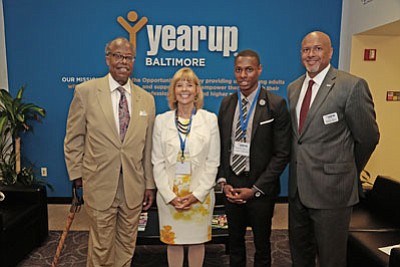BALTIMORE — Born and raised in Baltimore, Roland Selby was drawn to the nonprofit Year Up Baltimore, when two of his relatives entered the program and a short time later, a head- hunter approached him about becoming executive director.
Year Up, a college and career development program where low to moderate-income students ages 18 to 24 earn money while they learn, aligned with his passion and interests, said Selby, who holds a B.S. in accounting from Morgan State University.
“I am motivated by achievement in everything that I do. I am extremely competitive and results driven,” he said. “I continuously seek to develop myself professionally, personally and spiritually. I also take pride in the success of my team and their accomplishments, especially those I mentor.”
Since joining Year Up Baltimore, Selby has expanded the number of students served and increased the organization’s footprint at Baltimore City Community College (BCCC), as well as the partnerships with Maryland businesses.
Courtesy Photo
(Left to right) Marcus Washington, WJZ-TV news anchor; Roland Selby, executive director, Year Up Baltimore; and Year Up Baltimore student Adam Megahed on the set of WJZ-TV’s program “On Time.”
“It’s important that the program makes a direct contribution to help the city by connecting young adults with the opportunities they want and need by placing them with local businesses like BGE, Horsetail Technologies, TOPKATS Group, and PROARC, Inc.,” he said.
“I was a typical teen. I enjoyed socializing, playing sports and I was a bit rebellious but overall I was not very focused and did not have any goals,” Selby said. “Fortunately, I had support in both my parents and grandparents and a host of caring adults as mentors. That guidance and wisdom assisted me with navigating the trials and challenges of adolescence and helped me to become grounded and focused on achieving short term goals such as completing under graduate studies, pursuing a meaningful career, and providing insight on how to be a productive citizen of the world.”
Year Up officials note that 12 million jobs that require candidates with post-secondary education will go unfilled in the next decade while six million young adults are disconnected from stable career pathways.
The solution, they say, includes connecting young adults who need opportunities with companies who need their talents. The nonprofit identifies urban young adults who are highly motivated but lack opportunities to enter the mainstream economy.
Officials speak with companies to understand the skills needed and participants spend six months in a classroom learning the hard skills sought by employers and the soft skills successful team members need.
Students then intern for six months with a Year Up partner company, applying their skills while gaining critical work experience. Upon graduation, participants are ready for a meaningful career in which they’re able to contribute to the economy and their community.
Approximately 83 percent of students are employed, earning $17 per hour or $35,000 annually. Each of the last two graduating cohorts received employment or became full-time students.
“Our program is based upon having high expectations for our students and to provide high support to assist them on the path of successfully earning an internship and in completing the program,” Selby said. “We use a contract to reinforce this philosophy and we state the following expectations: show up every day; be on time; dress professionally; and submit deliverables on time.”
By adhering to that contract and infusing core values into programmatic elements, Year Up helps to provide a foundation for students to be successful.
“Participants are going to be challenged personally and academically while they are growing professionally. Our contract system is designed to model expectations of professional behaviors and provides room for students to learn and grow,” he said.
“Year Up is not easy. They will need to be resilient and able to bounce back and fail forward. If anyone is interested in being a part of Year Up they have to be open to the process.”
To participate in Year Up Baltimore, individuals must be between 18 and 24; have a high school diploma or GED; be from a low-to-moderate income family; a U.S. citizen, permanent resident or possess an employment authorization card; be available five days a week for the full year of the program; attend Baltimore City Community College; and be motivated to learn technical and professional skills.
For more information or to apply to participate in the program, visit www.yearup.org/Baltimore or call 410-919-9530.

